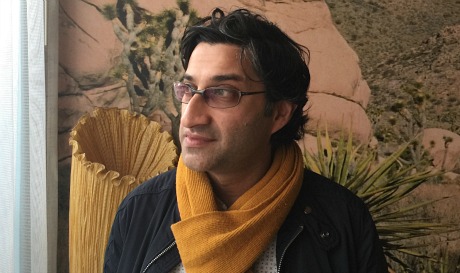The day before yesterday I spoke with Asif Kapadia, the director of the highly praised, Oscar-favored Amy, which has so far won the National Board of Review’s Best Documentary award as well as the same honor from the Satellite Awards. We met at the too-cool-for-school Standard Hotel with all the intense ice-blue colors and the hot babes roaming around. I began with my standard beef that almost all musician biopics (be they doc or narrative) are about self-destruction — dying young from drugs and alcohol abuse. Whether it’s Amy Winehouse, Hank Williams, Nina Simone, Janis Joplin, Jim Morrison, Charlie “Bird” Parker, Edith Piaf or Bix Beiderbecke — it’s the same damn story every time. They grew up hard, found fame with their great gift, burned brightly for a relatively brief time and then keeled over. Kapadia offered a smart and spirited retort, of course, and we were off to the races. Here’s the mp3.

Amy director Asif Kapadia — Friday, 12.4, 3:40 pm, lobby of Standard Hotel.
From my 7.2.15 review: “I came out of Asif Kapadia‘s Amy with a sense of sadness, of course. But I didn’t have any one reaction, to be honest. Ten minutes after the screening ended I bought Back to Black. When Amy Winehouse was great, which was nearly every time she sang, she was insanely great. But she was a mess for so long and such a foregone conclusion in terms of an early death that when it finally happened it was hardly a shock. It was almost a relief because at least the tortured aspects of her life had come to an end. That sounds a bit heartless but some people seem so bound for oblivion that you can’t help but feel a certain distance and disinterest.
My basic thought when the doc began was “Okay, how much purr and ectsasy before she starts to downswirl and die?” By the time Amy ended I was hissing Blake Fielder, her bastard ex-husband who definitely shortened her life with his cavalier attitude about drugs. Ditto her asshole dad, Mitch Winehouse, who very definitely leeched and didn’t help his daughter in the right guiding way. Without those two motherfuckers, Amy Winehouse might still be here.
And I’ll repeat again that the old saga of the self-destructive musical genius or famous performer — grew up gnarly, found fame with a great gift, burned brightly for a relatively brief time and then died from drug or alcohol abuse — has been told so many times that the tragic after-pall has seriously faded.
How many times can we go there? Winehouse, Jimi Hendrix, Hank Williams, Brian Jones, Elvis Presley, Janis Joplin, Jim Morrison, Charlie “Bird” Parker, Edith Piaf, Bix Beiderbecke…a story as old as the culture of recreational drugs and “yeah, man” indulgence itself.
Amy is nonetheless….well, tragic, yes, and blistering. And draining. Well crafted, very deep down — it makes you feel intimately involved and yet helpless. Here it comes, coming a bit closer, can’t stop it…she’s gone.
No one ever tried to instill any discipline in the poor girl. Her parents let her run wild more or less, starting at a very young age, and when things got a little bumpy and chaotic she had no coping skills except to retreat into comfort zones. Life is hard, but it’s harder if you lack a certain fortitude. I have to say I’m less and less persuaded these days that the story of a genius talent who wasn’t tough or canny enough to resist temptation or hold onto the raft amid heaving seas…I’m not so that’s such a terrific tale, to be honest. But the doc is quite good for what it is.
Why doesn’t Kapadia tell us how Winehouse was doing financially through the years? How big was her annual income when she started to catch on? Flush, of course, but how flush? How much did she spend on smack over the last three years or so, who did she cop from and where are those weasels now? And speaking of weasels, why doesn’t Kapadia go after Blake Fielder a bit more forcefully? The real Winehouse villains are her parents, it seems, but there doesn’t seem to be any question that Fielder was a kind of laid-back Satan incarnate, and that he definitely nudged Amy in the direction of death.
